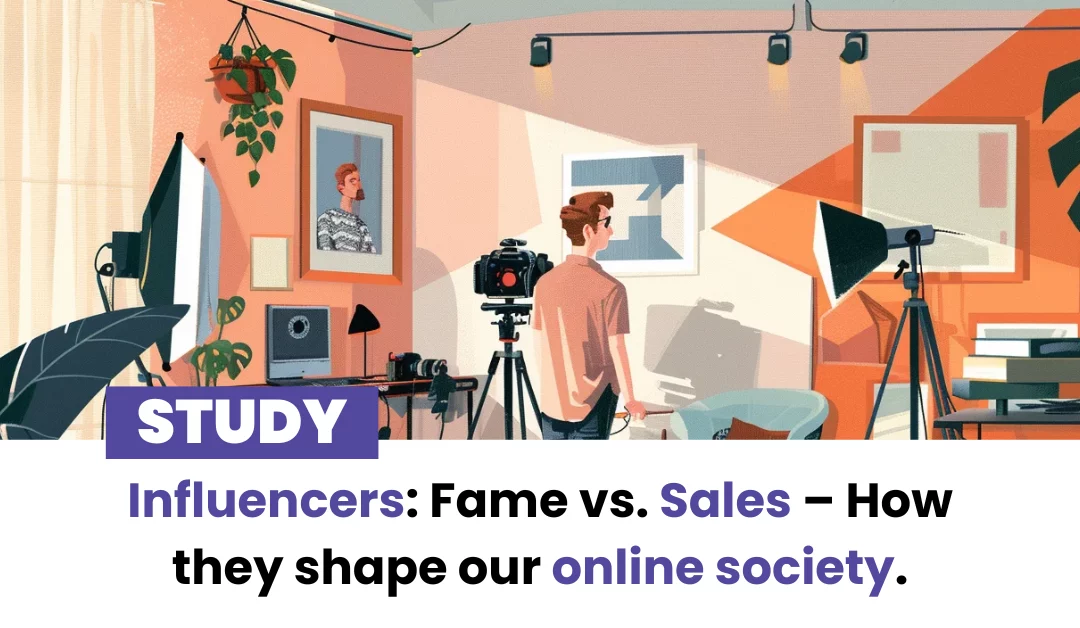Social networks have given rise to a new category of personalities, known as influencers. These individuals have acquired considerable influence over their followers, impacting their behavior and choices. It’s essential to understand the difference between notoriety and sales influencers, as they play distinct roles in the online sphere.
Impact on brands or mere notoriety?

It’s essential for brands to have discernment when collaborating with influencers, and to choose those who are aligned with their values and objectives. Each collaboration will differ depending on the influencer and audience. Even the social platform like Instagram or Facebook need to be acounted for.
Some can have a real influence on the behavior and opinions of their audience. They influence purchasing decisions, generate interest in a product or service, and help build consumer trust in a brand. The impact will differ with each influencers and collaboration as their followers won’t have the same response.
Others, on the other hand, may have a more superficial notoriety with no real impact on brands. In this context, they help to increase a brand’s visibility, particularly with new audiences or specific market segments.
Notoriety Influencers:
Notoriety influencers are generally famous personalities, such as actors, singers, athletes, or media personalities, who use social networks to share their daily lives. Their influence lies mainly in their popularity and their ability to generate a large number of followers. Brands often collaborate with these high-profile to increase their visibility and enhance their brand image.
Reach and exposure:
Thanks to their notoriety, these influencers have massive reach and can reach a large audience. Their posts can reach millions of followers, creating significant visibility for brands through social networks.
Inspiration and aspiration:
High-profile personalities often inspire their followers by sharing their life experiences, success stories and values. Their ability to inspire admiration can influence consumer behaviors and choices.

Sales Influencers:
Sales influencers focus more on promoting and recommending specific products or services. They are often experts in specific fields, such as fashion, beauty, health, or cooking. Their influence lies in their expertise and their ability to convince their followers to buy products or use services.
Expertise and trust:
Sales influencers develop a relationship of trust with their followers by sharing honest recommendations and providing sound advice. Their expertise in their specific field reinforces the credibility of their recommendations towards their online communities.
Call-to-action and conversions:
Sales influencers often use discount codes, affiliate links or brand partnerships to encourage their followers to take action and make a purchase. Their ability to generate conversions is a key aspect of their influence.
Coexistence and complementarity:
It’s important to note that brand and sales influencers are not mutually exclusive. In fact, there is often coexistence and complementarity between the two categories of Digital content creators. Brand influencers can help increase the visibility of products or services recommended by sales influencers, while sales influencers can leverage the popularity of brand influencers to boost their credibility.
Impact on consumers:
Social media personalities, whether notoriety or sales, have a significant impact on consumers.
Trends and buying behavior:
Influential content creators have the power to create trends by highlighting specific products or styles. Their recommendations can influence consumers’ purchasing choices and enable them to follow the latest trends.
Authenticity and commitment:
Consumers place great importance on the authenticity of Social media personalities. Their ability to interact with their followers and share real-life experiences is a key factor in maintaining a relationship of trust.
Challenges and reflections:
The rise of influencers also raises important challenges and questions.
Transparency and regulation:
Transparency is essential in the relationship between influencers and their followers. It is crucial to regulate practices such as hidden advertising, paid partnerships, and misleading reviews in order to preserve consumer trust.
Social responsibility:
Social media personalities have a responsibility to their audience. Their actions and values can have an impact on the behavior and opinions of their followers. It’s important to promote responsible practices and convey positive messages.
In conclusion, fame and sales influencers occupy distinct roles in the online world through the different social networks and platforms. While fame influencers attract attention through their popularity, sales influencers focus on recommending specific products and services. Their influence on consumers is significant, but it also requires reflection on the issues of transparency, responsibility, and authenticity. In our constantly evolving society, they will continue to shape our online behavior and redefine the norms of modern communication.

